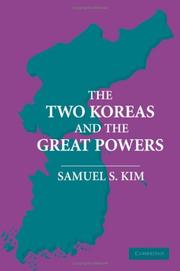| Listing 1 - 10 of 30 | << page >> |
Sort by
|
Book
Year: 1996 Publisher: Washington : National Defense University,
Abstract | Keywords | Export | Availability | Bookmark
 Loading...
Loading...Choose an application
- Reference Manager
- EndNote
- RefWorks (Direct export to RefWorks)
EAST ASIA--FOREIGN RELATIONS --- EAST ASIA--NATIONAL SECURITY
Book
ISBN: 9780230210110 0230210112 1349302775 9786612671753 0230244742 1282671758 Year: 2009 Publisher: Basingstoke Palgrave Macmillan
Abstract | Keywords | Export | Availability | Bookmark
 Loading...
Loading...Choose an application
- Reference Manager
- EndNote
- RefWorks (Direct export to RefWorks)
Book
ISBN: 9781107167230 9781316711620 9781316616406 Year: 2017 Publisher: Cambridge Cambridge University Press
Abstract | Keywords | Export | Availability | Bookmark
 Loading...
Loading...Choose an application
- Reference Manager
- EndNote
- RefWorks (Direct export to RefWorks)
East Asia is richer, more integrated and more stable than ever before, whilst East Asian defense spending is now roughly half of what it was in 1990 and shows no sign of increasing. There is no evidence of any Asian arms race. All countries in the region are seeking diplomatic, not military solutions with each other. Yet this East Asia reality still runs counter to a largely Western narrative that views China's rise as a threat and the region as increasingly unstable.The author argues here that American grand strategy should emphasize diplomatic and economic relations with the region, rather than military-first policies. Using longitudinal and comparative data, statistical analysis, and intensive research in selected East Asian countries, he suggests that East Asia is in sync with the American desire to share burdens and that the region may in fact be more stable than popularly believed.
Book
ISBN: 9781626183728 Year: 2013 Publisher: New York : Nova Science Publishers,
Abstract | Keywords | Export | Availability | Bookmark
 Loading...
Loading...Choose an application
- Reference Manager
- EndNote
- RefWorks (Direct export to RefWorks)

ISBN: 080145798X 0801459222 9780801459221 9780801446122 0801446120 9780801457982 0801474906 9780801474903 Year: 2010 Publisher: Ithaca, NY
Abstract | Keywords | Export | Availability | Bookmark
 Loading...
Loading...Choose an application
- Reference Manager
- EndNote
- RefWorks (Direct export to RefWorks)
For the past sixty years, the U.S. government has assumed that Japan's security policies would reinforce American interests in Asia. The political and military profile of Asia is changing rapidly, however. Korea's nuclear program, China's rise, and the relative decline of U.S. power have commanded strategic review in Tokyo just as these matters have in Washington. What is the next step for Japan's security policy? Will confluence with U.S. interests-and the alliance-survive intact? Will the policy be transformed? Or will Japan become more autonomous? Richard J. Samuels demonstrates that over the last decade, a revisionist group of Japanese policymakers has consolidated power. The Koizumi government of the early 2000's took bold steps to position Japan's military to play a global security role. It left its successor, the Abe government, to further define and legitimate Japan's new grand strategy, a project well under way-and vigorously contested both at home and in the region. Securing Japan begins by tracing the history of Japan's grand strategy-from the Meiji rulers, who recognized the intimate connection between economic success and military advance, to the Konoye consensus that led to Japan's defeat in World War II and the postwar compact with the United States. Samuels shows how the ideological connections across these wars and agreements help explain today's debate. He then explores Japan's recent strategic choices, arguing that Japan will ultimately strike a balance between national strength and national autonomy, a position that will allow it to exist securely without being either too dependent on the United States or too vulnerable to threats from China. Samuels's insights into Japanese history, society, and politics have been honed over a distinguished career and enriched by interviews with policymakers and original archival research. Securing Japan is a definitive assessment of Japanese security policy and its implications for the future of East Asia.
National security --- Japan --- East Asia --- Military policy. --- Foreign relations --- Foreign relations. --- National security - Japan --- Japan - Military policy --- Japan - Foreign relations - 1945 --- -East Asia - Foreign relations
Book
ISBN: 9780230110977 0230110975 1349293598 9786613067395 0230118445 1283067390 Year: 2011 Publisher: New York : Palgrave Macmillan,
Abstract | Keywords | Export | Availability | Bookmark
 Loading...
Loading...Choose an application
- Reference Manager
- EndNote
- RefWorks (Direct export to RefWorks)
International relations. Foreign policy --- East Asia --- Foreign public opinion. --- Relations. --- Foreign relations administration. --- Foreign public opinion --- Relations --- Foreign relations administration --- East Asia - Foreign public opinion --- East Asia - Relations --- East Asia - Foreign relations administration
Book
ISBN: 9781137364173 1137364173 Year: 2014 Volume: *1 Publisher: New York ; Basingstoke Palgrave Macmillan
Abstract | Keywords | Export | Availability | Bookmark
 Loading...
Loading...Choose an application
- Reference Manager
- EndNote
- RefWorks (Direct export to RefWorks)
"There is a significant uncertainty around US security commitment to East Asia over the next 15-20 years, underpinned by China's economic and military rise. This new collection investigates how and whether this affects the present-day strategic perceptions and behaviour of East Asian nations, and of the US itself. By exploring how regional actors deal with uncertainties that are inherent to the current geopolitical situation in East Asia, the contributors demonstrate that strategic uncertainty has become a major factor in the shaping of the security order in East Asia, which has resulted in the emergence of alternative models of order that do not necessarily exclude America"--
Polemology --- United States --- East Asia --- Security, International --- Foreign relations --- Political science --- International Relations --- General. --- Political Freedom & Security --- Security, International - East Asia --- United States - Foreign relations - East Asia --- East Asia - Foreign relations - United States --- United States of America
Book
ISBN: 9780415735131 9781315819433 9781317819844 9781317819851 9781138066236 1315819430 0415735130 Year: 2014 Publisher: London ; New York : Routledge/Taylor & Francis Group,
Abstract | Keywords | Export | Availability | Bookmark
 Loading...
Loading...Choose an application
- Reference Manager
- EndNote
- RefWorks (Direct export to RefWorks)
"With featuring far-reaching diversities and disparities among the regional states in their political, economic and social systems and cultural and religious orientations, East Asia is a microcosm of international society at large. Nevertheless, there are unique dynamics unfolding in East Asia at the turn of the twenty-first century, namely the rise of China as a contender for regional and global hegemony and a set of collective initiatives to integrate the region into a harmonious community. This book provides new arguments on China's rise and the transformation of East Asia and analyzes the foreign policy behavior of the regional states and relations among them. In doing so, the contributors show why and how China is rising, and in turn, the regional structures or institutions that are emerging as dominant in East Asia. Furthermore, given the East Asian context where the world's second and third largest economies coexist with much smaller states and with China's ascendency likely to continue, this book challenges the pervasive dichotomy of hegemony and community. This allows for a fuller and more nuanced account of China's role and the shifting regional policies in East Asia in which hegemonic cooperation does not necessarily lead to a hegemonic form of regional order. Presenting strategic, political, economic and historical perspectives on China's changing role in the region and the development of regionalism, China's Rise and Regional Integration in East Asia will be of great interest to students and scholars of Chinese politics, Asian politics, international relations and regionalism"--
East Asian cooperation --- China --- East Asia --- Foreign relations --- Economic integration --- East Asian cooperation. --- Political science --- Social science --- General. --- International Relations --- Ethnic Studies --- Economic integration. --- China - Foreign relations - East Asia --- East Asia - Foreign relations - China --- East Asia - Economic integration
Book
ISBN: 9788776942236 9788776942229 Year: 2017 Publisher: Copenhagen NIAS Press
Abstract | Keywords | Export | Availability | Bookmark
 Loading...
Loading...Choose an application
- Reference Manager
- EndNote
- RefWorks (Direct export to RefWorks)
Stretching from the cold steppes of Mongolia to the tropical jungles and wetlands of Indonesia, East Asia is home to 30 % of humanity. And since it is divided between 17 countries, several with border disputes or local separatist movements, it is no surprise that the region has seen its share of conflict. Indeed, for over three decades after the end of World War II, East Asia was the bloodiest place on the planet, home to several major conflicts. But then something strange happened - the region saw a steep decline in violent conflicts and in subsequent years this relative peace has actually deepened. As such, East Asia saw a dramatic drop in its share of global battle deaths from 80 % in 1946-79 to just 6.2 % in the 1980s. Since 1990 its share has been a mere 1.7 %. In recent years, a group of scholars based at Sweden's Uppsala University and led by Stein Tonnesson have investigated this so-called East Asian Peace. Instead of explaining conflict, they have sought to explain peace. The book recounts heated discussions over how to explain a regional transition to peace. Was it due to a changing power balance ? The ASEAN Way ? China's 'peaceful development' doctrine ? Growing economic interdependence ? Or (as the author contends) a series of national priority shifts by powerful Asian leaders who prioritized economic growth and thus needed external and internal stability ? The author also discusses why Thailand, Myanmar and the Philippines have not yet achieved internal peace, and includes a thorough discussion of how to predict China's future. Can China keep peace with its neighbours as well as with the USA ?
Peace --- S09/0264 --- Coexistence, Peaceful --- Peaceful coexistence --- China: Foreign relations and world politics--General works: since 1989 --- East Asia --- Foreign relations. --- EAST ASIA--FOREIGN RELATIONS --- International relations --- Disarmament --- Peace-building --- Security, International --- War

ISBN: 9780521660631 9780521668996 9780511510496 0511220669 0511218907 9780511218903 0521660637 0521668999 9780511220913 051122091X 9780511220661 051121958X 9780511219580 1280515945 9781280515941 0511510497 0521660637 110715782X 0511316992 Year: 2006 Publisher: Cambridge New York Cambridge University Press
Abstract | Keywords | Export | Availability | Bookmark
 Loading...
Loading...Choose an application
- Reference Manager
- EndNote
- RefWorks (Direct export to RefWorks)
This book explores Korea's place in terms of multiple levels and domains of interaction pertaining to foreign-policy behaviors and relations with the four regional/global powers (China, Russia, Japan, and the United States). The synergy of global transformations has now brought to an end Korea's proverbial identity and role as the helpless shrimp among whales, and both North Korea and South Korea have taken on new roles in the process of redefining and projecting their national identities. Synthetic national identity theory offers a useful perspective on change and continuity in Korea's turbulent relationships with the great powers over the years. Following a review of Korean diplomatic history and competing theoretical approaches, along with a synthetic national-identity theory as an alternative approach, one chapter each is devoted to how Korea relates to the four powers in turn, and the book concludes with a consideration of inter-Korean relations and potential reunification.
International relations. Foreign policy --- History of Asia --- North Korea --- South Korea --- World politics --- Korea (South) --- Korea (North) --- United States --- East Asia --- Politics and government. --- Foreign relations --- Foreign relations. --- Politics and government --- Social Sciences --- Political Science --- Korea (South) - Politics and government --- Korea (North) - Politics and government --- United States - Foreign relations - 21st century --- East Asia - Foreign relations
| Listing 1 - 10 of 30 | << page >> |
Sort by
|

 Search
Search Feedback
Feedback About UniCat
About UniCat  Help
Help News
News